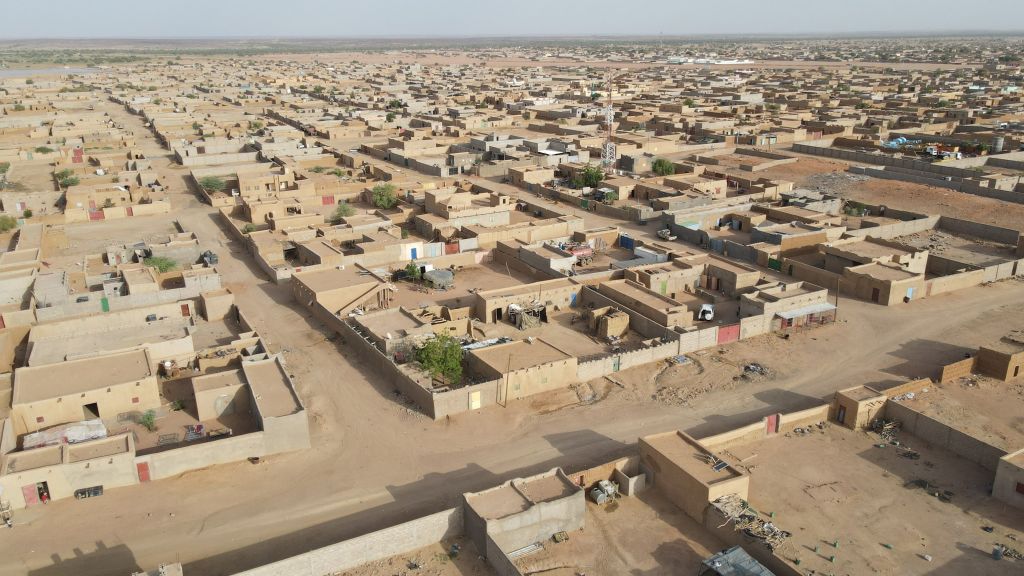ADF STAFF
More than 100 Malian Armed Forces (FAMA) vehicles deployed in a slow-moving convoy from the city of Gao on October 2. Their ultimate destination: the town of Kidal, a Tuareg stronghold in the north that has been controlled by a coalition of former rebels since 2013.
The two sides renewed hostilities in August after the collapse of the 2015 Algiers peace accord, which had not been fully implemented but granted some regional autonomy to Tuareg groups.
Fighting and rhetoric have since escalated.
“The process of irreversible occupation of Malian lands, which is part of Mali’s unity, continues and will continue despite the vain opposition of some of its misguided sons,” FAMA spokesman Col. Souleymane Dembélé said on national television on October 3.
“Our valiant army will fight to the last breath to defend the integrity of our beloved homeland, which is one and indivisible.”
Fighting began on August 11 over control of the town of Ber, where the United Nations peacekeeping mission known as MINUSMA said in a statement that it had “expedited its withdrawal … due to the deteriorating security.”
Mali’s ruling junta demanded MINUSMA leave the country by the end of 2023. Since August, MINUSMA has been handing over its camps to government authorities.
The former Tuareg rebels believe the bases in northern Mali should be returned to their control and expressed concern that MINUSMA’s withdrawal would give the junta a “pretext” to reoccupy areas in northern Mali that the Algiers peace accord had ceded to them.
Experts have questioned why Mali, which already is caught in the grips of multiple terrorist insurgencies, would further extend its military into Tuareg-controlled parts of the north.
“It is not in the interest of Malians to open a new conflict in the north,” Mohamed Amara, a sociologist and researcher from Malian capital Bamako, told The New Humanitarian magazine. “The resumption of the war between the government and the [former Tuareg rebels] does not suit anybody.”
The Coordination of Azawad Movements (CMA), an alliance of mostly ethnic Tuareg groups that historically has sought independence or autonomy from Mali, said in an August 11 statement that it “repulsed a complex attack by the FAMA and [the Russian mercenary group] Wagner” in Ber.
Since then, the CMA has conducted a series of attacks on FAMA positions. On September 9, the CMA claimed it shot down a Russian-provided fighter jet and a Wagner helicopter.
The group claimed on September 30 to have captured a base and killed 81 FAMA soldiers in Dioura, about 420 kilometers from Bamako — the furthest south that the rebels had pushed.
On October 7, FAMA’s convoy took control of the village of Anefis, just over the border of the Kidal region and about 100 kilometers from Kidal.
The Tuareg coalition shrugged off the loss.
“Anefis is not a major issue for us,” spokesperson Almou Ag Mohamed told Agence France-Presse. “We are at war, a war that will be long and will not be fought down to one position.
“Anefis is only one position, and the front is mobile.”
Jonathan Guiffard, a Sahel expert with the Institute Montaigne think tank, believes FAMA and the Wagner contingent lack the capacity to take back control of the country.
“The Malian forces’ strategic problem is their lack of resources,” he told France 24. “Either they endure or they carry out dynamic operations which result in raids here and there. It’s the most they can do.”
Little is known of the CMA’s numbers, weaponry or equipment. But the Kidal region is known as a waystation in the trafficking of arms from Libya.
Guiffard said that despite a decade without open warfare, the Tuareg alliance likely will be ready for a protracted conflict.
“The CMA is less prepared than in 2012 but has the land to itself and is accustomed to an asymmetrical war strategy,” he said.

